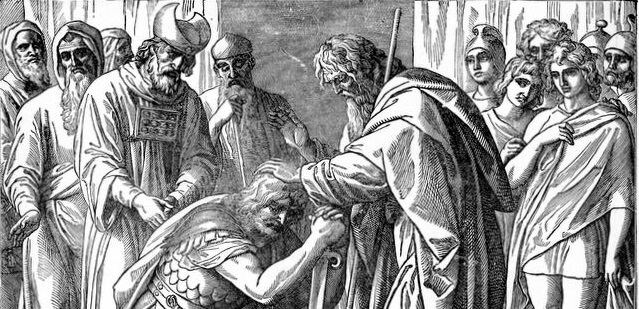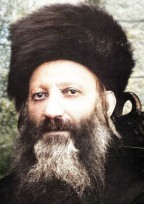“Moshe spoke to God, saying, ‘Let God... appoint someone over the community... so that God’s community will not be like sheep that have no shepherd.’
God told Moshe, ‘Take Yehoshua the son of Nun, a man of spirit, and lay your hand on him.’
Moshe did as God ordered him. He took Joshua and had him stand before Elazar the priest and before the entire community. He then laid his hands on him and commissioned him.” (Bamidbar 27:15-23)
Yehoshua's appointment to replace Moshe was a critical point in the spiritual and political development of the Jewish people. Every detail of this transfer of power is significant.
We read that God commanded Moshe to “lay your hand” on Joshua, and the Torah testifies that Moshe did as he was commanded. In fact, Moses placed both of his hands on his disciple. What is the significance of this change?

Material and Spiritual Leadership
The Jewish people require two types of leadership. Like any other nation, they need leaders for worldly matters, whether they be economic, societal, political, or military. In addition, as bearers of God’s Torah, they require spiritual guidance. Capable leadership will bring success in both spheres, revealing the greatness of Israel. All will recognize the wisdom of their ways, as befits a special people who enlighten the world with spiritual knowledge and holiness.
In his plea before God, we find that Moshe referred to the people as “the community” and also as “God’s community.” This reflects Moshe's desire that they have a leader in both spheres, material - as any nation - as well as spiritual - as “God’s community.”
One or Two Leaders?
The question is: Can both of these realms be combined under the guidance of a single leader? Or perhaps, it is necessary to establish two positions, one leader to govern the nation’s material needs, and a second for spiritual direction.
If there is no conflict between the two functions, it is preferable to limit the number of leaders. Shlomo HaMelech described the instability generated by too many authorities: “Because of a land’s sins, it will have many rulers. But a leader of understanding and knowledge will bring stability” (Mishlei 28:2).
The answer - whether spiritual and worldly leadership should be combined into one position - depends upon the state of the nation and the world. When God’s unity is manifest and the entire world enjoys God’s beneficence, anything contributing to the world’s advance is directly connected to God’s will. With material progress, the spirit gains understanding and insight. As the Talmud teaches, “All of your builders will be disciples of God” (Berachot 64a, based on Isaiah 54:13). Those who build up the world, in all of its aspects, will be granted enlightenment and wisdom. All who facilitate the world’s progress will be carrying out the will of their Creator. In their actions, they cleave to God’s holiness, just like the holiness associated with performing mitzvot and studying Torah.
In such an elevated reality, there is no conflict between the spiritual and material spheres, and supervision of both realms should be combined under a single leader. The prophetic visions foretold this state of the world under the leadership of the messianic king.
This was also the level of Moshe who was responsible for both the spiritual and physical needs of Israel in the wilderness. He was an עבד נאמן, a faithful servant who looked after the people’s material needs, yet was also crowned with כליל תפארת, pure splendor, an expression of Moshe's lofty spiritual state. Moshe never felt a contradiction between these two functions. His bodily powers were not weakened when he experienced prophecy, due to his clear recognition of the unity in God’s Divine will.
But when we are unable to attain such an elevated state - when we can grow spiritually only when we are not encumbered by material occupations - then it is necessary to limit the time and effort spent in worldly matters.
In summary: when the Jewish people merit the revelation of God’s unity in all realms, then they should be governed by one leader, who provides enlightenment in spiritual matters and leadership in material ones. Occupation in worldly matters will not distance him from holiness.
When, however, the Jewish people are not on this spiritual level, there is a conflict between the physical and the spiritual realms. Then they require two distinct leaders.
Two Hands
Now we can understand why God commanded Moshe to place a single hand on Yehoshua. The hand is a metaphor for control and governance. Placing two hands would reflect control over both realms, both spiritual and material. Were God to command Moshe to place both of his hands on Yehoshua, that would indicate that - for all times - both spiritual and practical leadership would be Divinely issued. In dark times, when material life is distant from the spiritual, we can hardly ascribe to the material leader the same Divine right to rule that Moshe passed on to his disciple.
Why then did Moshe place both hands on Yehoshua?
Moshe understood from God’s command that only the spiritual realm would benefit from leaders who are Divinely-appointed. Nonetheless, Moshe wanted to prepare the stage for a future world, an era in which both spheres will be united under one leader. Therefore, he made Yehoshua stand before both the Kohen Gadol (representing the spiritual realm) and the common people (the physical). Moshe then placed both of his hands on the new leader.
(Adapted from Otzarot HaRe’iyah vol. II, pp. 179-186, by Rav Chanan Morrison)


No comments:
Post a Comment